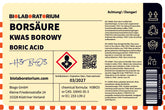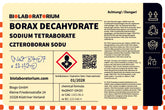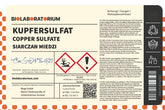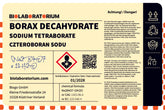The key substances of the fertilizer industry: their functions and significance
The fertilizer industry is an essential part of modern agriculture. It produces a variety of nutrients and chemicals that are indispensable for the growth and health of crops. In this blog post, we will take a closer look at some of the key substances in this industry and discuss their functions and significance.
Nitrogen-containing fertilizers
Nitrogen is one of the main nutrients plants need for their growth. Therefore, nitrogen-containing fertilizers play a central role in the fertilizer industry. The most important representatives include:
Magnesium nitrate
Magnesium nitrate is a salt that provides nitrogen and magnesium in a form easily absorbed by plants. It promotes the growth and development of leaves and stems.
Potassium nitrate
Potassium nitrate is a compound of potassium and nitrogen. Potassium is an essential macronutrient responsible, among other things, for regulating water balance and strengthening the cell walls of plants.
Calcium nitrate
Calcium nitrate provides calcium and nitrogen. Calcium is important for the stability of cell walls and root formation. Additionally, it can prevent deficiency symptoms.
Potassium-containing fertilizers
In addition to nitrogen, potassium is also an important macronutrient for plants. Potassium-containing fertilizers such as potassium chloride help increase the resistance of crops and improve their drought tolerance.
Chelating agents
Chelating agents such as EDTA (ethylenediaminetetraacetic acid) play an important role in fertilizer production. They bind metal ions such as iron, zinc, or copper and make them easily available to plants. This helps prevent deficiencies.
Other important substances
In addition to the substances mentioned so far, there are a number of other chemicals that play an important role in fertilizer production:
Zinc sulfate
Zinc sulfate is a source of the nutrient zinc, which is needed, among other things, for the formation of enzymes and proteins in plants.
Epsom salt (magnesium sulfate)
Magnesium sulfate provides magnesium, a component of chlorophyll. Magnesium is thus essential for photosynthesis.
Technical sulfur
Sulfur is also an important macronutrient for plants. It plays a role in the formation of proteins and enzymes.
The importance of chemistry in the fertilizer industry
The fertilizer industry is a prime example of how chemistry contributes to solving pressing challenges in agriculture. By providing nutrients, trace elements, and other important substances, it enables efficient and sustainable food production.
At the same time, the production of fertilizers itself places high demands on chemistry. Complex production processes, quality controls, and compliance with strict safety standards require a deep understanding of chemical relationships.
Overall, it is evident that chemistry plays a key role in the fertilizer industry - both in the production of products and their application in agriculture. Without the expertise and innovative power of chemistry, an adequate food supply for the growing world population would hardly be conceivable.
Conclusion
The fertilizer industry is an important part of modern agriculture. By providing nutrients, trace elements, and other chemical substances, it significantly contributes to increasing crop yields and productivity.
Substances such as magnesium nitrate, potassium nitrate, calcium nitrate, potassium chloride, EDTA, zinc sulfate, Epsom salt, and technical sulfur play a central role. They fulfill various functions - from promoting plant growth to remedying deficiencies.
Chemistry is thus an indispensable component of the fertilizer industry. Without the profound knowledge and innovative power of chemists, an adequate food supply for the world's population would hardly be possible.



















